| The first week of using my glucose monitor, the goal was to keep it real. To identify how my usual routines, activity, meals, snacks and cravings influence the spikes and dips of my blood sugar; chocolate chip cookies and all! It was also an awareness tool that I snack too frequently and don't eat enough satisfying, balanced meals. There is a reason people have success with intermittent fasting versus intermittent snacking! The fasting allows for flattening of the glucose curves; the snacking contributes to spikes. My snacks raised my blood sugar much more than my meals of baked cod, avocado salad, or eggs and bacon. Eating a nutrient-dense meal that doesn't send my blood sugar on a roller coaster is a healthier choice than frequent spikes from a Kombucha, chocolate chip cookie, or dates dipped in almond butter. After collecting the data for 5 days, yesterday I decided to try to implement a few recommended tweaks shared by my dietitian Stephanie, my friend/physical therapist/athlete Stacy Scherzer, as well as hacks from The Glucose Revolution. The result was satisfying and satieting with minimal spikes, and the spikes were predictable and below 110mg/dL..not nearly the range from earlier in the week. |

To extrapolate on the above data, in the morning I enjoyed a cup of coffee then went to the gym at 8:45a.m. I did cardio and weights for about 90 minutes. My blood sugar remained between 70 and 90mg/dL throughout this time. I was hungry however and glad to get home and try Stacy Scherzer's advice. "One thing that has been helpful for both Karl and I with the carb timing: (working with a dietician health coach, me to gain muscle, him to lose fat) has been to have our highest carb meal within an hour or so after a workout. Meaning a weight lifting or interval training type workout. That is when our muscles just soak it all up and replace the depleted glycogen stores. Along with a good amount of protein too. We time those meals differently because I tend to workout earlier in the day and him in early evenings." I paired Stacy's recommendation with a few considerations regarding food order from The Glucose Goddess, particularly eat fiber first, preferably a green salad or vegetable which I chose avocado with a spinach salad and coleslaw. Yes, an odd lunch but the kicker was I followed it with chocolate chips as I was craving something sweet plus curious if the fiber would reduce the glucose spikes. It did. I stayed beneath 100mg/dL with those foods. Of course, probably because the meal lacked significant protein, hunger set in by 2pm so I enjoyed the remaining 3 energy date balls. Again, I suspected I was risking a spike but it was minimal compared to earlier in the week when dates shot my glucose up to nearly 160mg/dL. We love chicken wings in the air fryer seasoned with garlic salt, onion powder, paprika, and cayenne so that was our dinner. As one would expect, it was primarily protein which had minimal impact again on glucose. The small spike was to satisfy my sweet tooth, however I have to believe that 51% cacao chocolate chips are better than an actual chocolate chip cookie. Mindful eating doesn't mean that we remove all food pleasure from our life. Instead it is about recognizing the body's response to certain foods, considering the time of day, the serving size, and the food order plus listening to the needs of your own body. What is agreeable for one person may not be ideal for you.
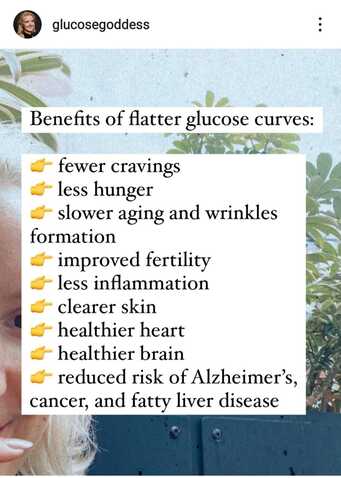
This week my goal is to be more disciplined. Reduce snacking, get my 10,000 steps, hit the weights, and eat more nutrient dense meals. I have seen the natural consequences of my daily grazing and know the side-effects of frequent spikes is inflammation. Chronic inflammation is the root cause of many diseases including heart disease, fatty liver disease, diabetes, cancer, arthritis, and Alzheimer's. Even something as benign as wrinkles has a link to inflammation as it destroys the skin's structural components including collagen and elastin contributing to wrinkle formation. One of the concepts I am seeking to understand is how insulin, the hormone secreted in response to elevated glucose, drives inflammation. Insulin of course is also the "fat-storage" hormone so these spikes do influence one's ability to lose weight. There are many studies linking insulin resistance to metabolic inflammation leading to obesity and a whole host of diseases and processes. This science is not for me to explain to you (because I am not a scientist, researcher or doctor) but rather something for you to research for the sake of your own health and wellness. I share to aid in my own understanding and perhaps prompt you to be curious and investigate as a means to enhance your life, improve your health span, and potentially prevent or delay the onset of disease which seems so prevalent in our society. Thanks for following along on my health journey!
p.s. this is an article that NutriSense shares with its members regarding the relationship between weight loss and blood glucose. www.nutrisense.io/blog/weight-loss-and-blood-glucose
p.s. this is an article that NutriSense shares with its members regarding the relationship between weight loss and blood glucose. www.nutrisense.io/blog/weight-loss-and-blood-glucose
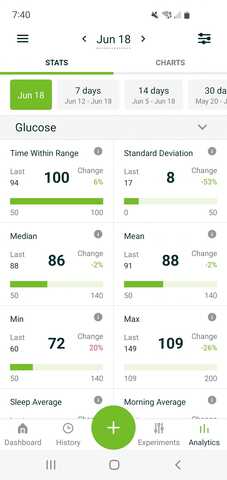
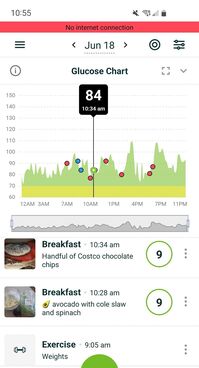
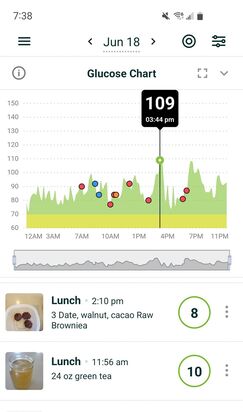
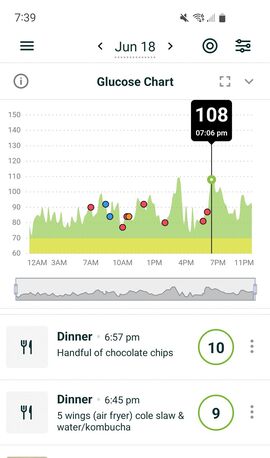
 RSS Feed
RSS Feed